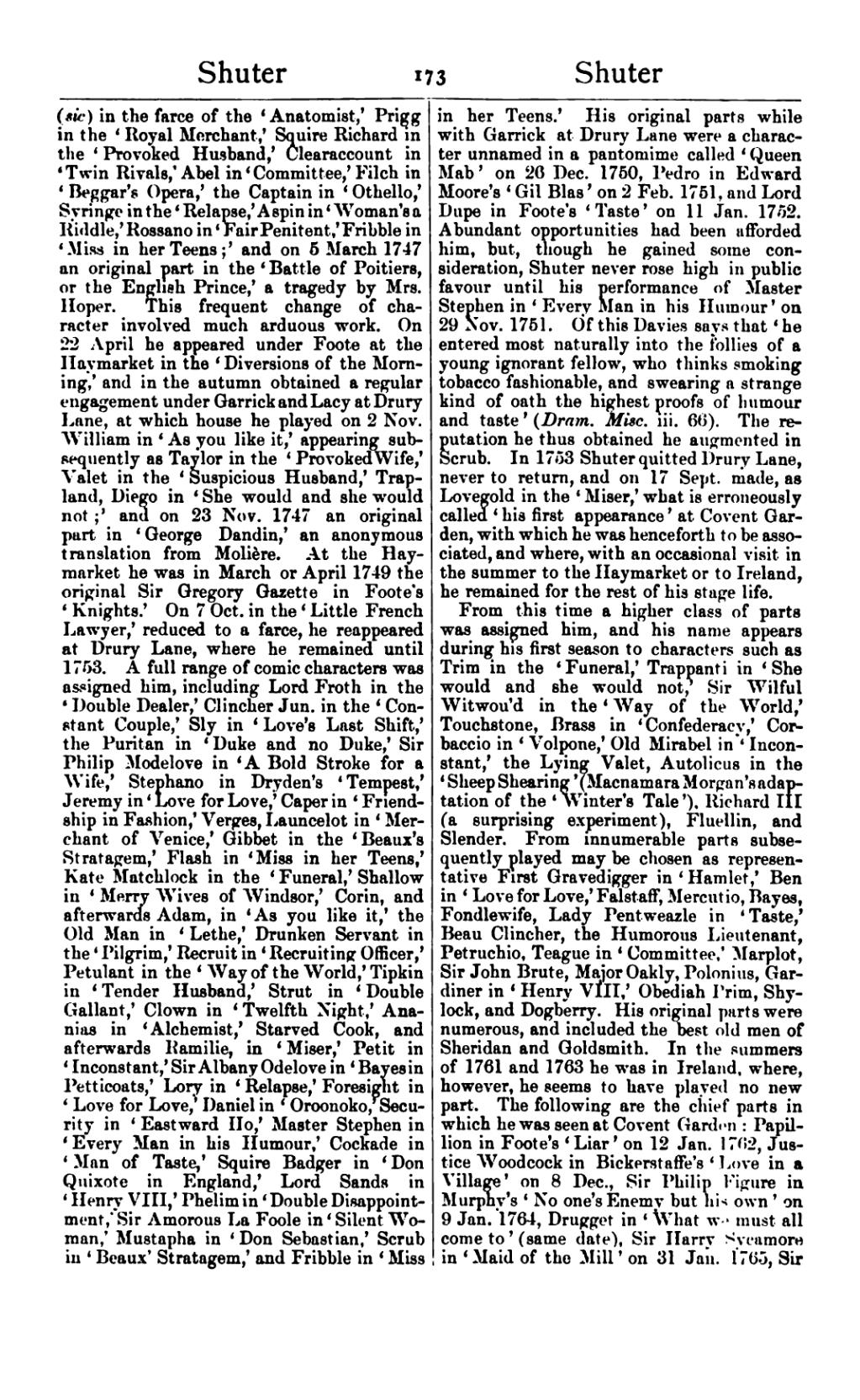(sic) in the farce of the ‘Anatomist,’ Prigg in the ‘Royal Merchant,’ Squire Richard in the ‘Provoked Husband,’ Clearaccount in ‘Twin Rivals,’ Abel in ‘Committee,’ Filch in ‘Beggar's Opera,’ the Captain in ‘Othello,’ Syringe in the ‘Relapse,’ Aspin in ‘Woman's a Riddle,’ Rossano in ‘Fair Penitent,’ Fribble in ‘Miss in her Teens;’ and on 5 March 1747 an original part in the ‘Battle of Poitiers, or the English Prince,’ a tragedy by Mrs. Hoper. This frequent change of character involved much arduous work. On 22 April he appeared under Foote at the Haymarket in the ‘Diversions of the Morning,’ and in the autumn obtained a regular engagement under Garrick and Lacy at Drury Lane, at which house he played on 2 Nov. William in ‘As you like it,’ appearing subsequently as Taylor in the ‘Provoked Wife,’ Valet in the ‘Suspicious Husband,’ Trapland, Diego in ‘She would and she would not;’ and on 23 Nov. 1747 an original part in ‘George Dandin,’ an anonymous translation from Molière. At the Haymarket he was in March or April 1749 the original Sir Gregory Gazette in Foote's ‘Knights.’ On 7 Oct. in the ‘Little French Lawyer,’ reduced to a farce, he reappeared at Drury Lane, where he remained until 1753. A full range of comic characters was assigned him, including Lord Froth in the ‘Double Dealer,’ Clincher Jun. in the ‘Constant Couple,’ Sly in ‘Love's Last Shift,’ the Puritan in ‘Duke and no Duke,’ Sir Philip Modelove in ‘A Bold Stroke for a Wife.’ Stephano in Dryden's ‘Tempest,’ Jeremy in ‘Love for Love,’ Caper in ‘Friendship in Fashion,’ Verges, Launcelot in ‘Merchant of Venice,’ Gibbet in the ‘Beaux's Stratagem,’ Flash in ‘Miss in her Teens,’ Kate Matchlock in the ‘Funeral,’ Shallow in ‘Merry Wives of Windsor,’ Corin, and afterwards Adam, in ‘As you like it,’ the Old Man in ‘Lethe,’ Drunken Servant in the ‘Pilgrim,’ Recruit in ‘Recruiting Officer,’ Petulant in the ‘Way of the World,’ Tipkin in ‘Tender Husband,’ Strut in ‘Double Gallant,’ Clown in ‘Twelfth Night,’ Ananias in ‘Alchemist,’ Starved Cook, and afterwards Ramilie, in ‘Miser,’ Petit in ‘Inconstant,’ Sir Albany Odelove in ‘Bayes in Petticoats,’ Lory in ‘Relapse,’ Foresight in ‘Love for Love,’ Daniel in ‘Oroonoko,’ Security in ‘Eastward Ho,’ Master Stephen in ‘Every Man in his Humour,’ Cockade in ‘Man of Taste,’ Squire Badger in ‘Don Quixote in England,’ Lord Sands in ‘Henry VIII,’ Phelim in ‘Double Disappointment,’ Sir Amorous La Foole in ‘Silent Woman,’ Mustapha in ‘Don Sebastian,’ Scrub in ‘Beaux' Stratagem,’ and Fribble in ‘Miss in her Teens.’ His original parts while with Garrick at Drury Lane were a character unnamed in a pantomime called ‘Queen Mab’ on 26 Dec. 1750, Pedro in Edward Moore's ‘Gil Blas’ on 2 Feb. 1751, and Lord Dupe in Foote's ‘Taste’ on 11 Jan. 1752. Abundant opportunities had been afforded him, but, though he gained some consideration, Shuter never rose high in public favour until his performance of Master Stephen in ‘Every Man in his Humour’ on 29 Nov. 1751. Of this Davies says that ‘he entered most naturally into the follies of a young ignorant fellow, who thinks smoking tobacco fashionable, and swearing a strange kind of oath the highest proofs of humour and taste’ (Dram. Misc. iii. 66). The reputation he thus obtained he augmented in Scrub. In 1753 Shuter quitted Drury Lane, never to return, and on 17 Sept. made, as Lovegold in the ‘Miser,’ what is erroneously called ‘his first appearance’ at Covent Garden, with which he was henceforth to be associated, and where, with an occasional visit in the summer to the Haymarket or to Ireland, he remained for the rest of his stage life.
From this time a higher class of parts was assigned him, and his name appears during his first season to characters such as Trim in the ‘Funeral,’ Trappanti in ‘She would and she would not,’ Sir Wilful Witwou'd in the ‘Way of the World,’ Touchstone, Brass in ‘Confederacy,’ Corbaccio in ‘Volpone,’ Old Mirabel in ‘Inconstant,’ the Lying Valet, Autolicus in the ‘Sheep Shearing’ (Macnamara Morgan's adaptation of the ‘Winter's Tale’), Richard III (a surprising experiment), Fluellin, and Slender. From innumerable parts subsequently played may be chosen as representative First Gravedigger in ‘Hamlet,’ Ben in ‘Love for Love,’ Falstaff, Mercutio, Bayes, Fondlewife, Lady Pentweazle in ‘Taste,’ Beau Clincher, the Humorous Lieutenant, Petruchio, Teague in ‘Committee,’ Marplot, Sir John Brute, Major Oakly, Polonius, Gardiner in ‘Henry VIII,’ Obediah Prim, Shylock, and Dogberry. His original parts were numerous, and included the best old men of Sheridan and Goldsmith. In the summers of 1761 and 1763 he was in Ireland, where, however, he seems to have played no new part. The following are the chief parts in which he was seen at Covent Garden: Papillion in Foote's ‘Liar’ on 12 Jan. 1762, Justice Woodcock in Bickerstaffe's ‘Love in a Village’ on 8 Dec., Sir Philip Figure in Murphy's ‘No one's Enemy but his own’ on 9 Jan. 1764, Drugget in ‘What we must all come to’ (same date), Sir Harry Sycamore in ‘Maid of the Mill’ on 31 Jan. 1765, Sir
